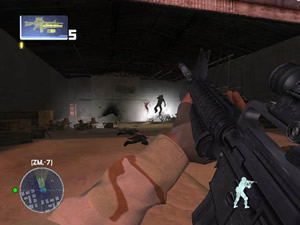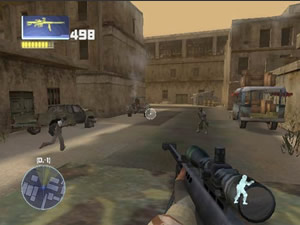An ungrounded flight.
Try coming up with an historical military conflict that has not already been used as the backdrop for a video game. The World Wars have been done, as has Vietnam and even the Gulf War. Korean War? Check. Civil War? Check. Mexican-American War? Wait…we have a winner! If anyone decides to blaze that trail in the future, they should come talk to me – I’ve got some great ideas for virtual burro battles.
So maybe my surprise at the audacity and questionable taste of releasing a game about the Black Hawk disaster is misplaced. Sure, the surviving families of the casualties might benefit from the fact that Novalogic is admirably donating part of the proceeds to their cause (a tax write-off, no less), but am I alone in finding the tragedy-turned-entertainment at the least ethically ambiguous? In the 2002 film, director Ridley Scott struck a balance between criticism of the U.N. policy in Somalia and a reverence for the camaraderie and heroism of the American troops. Maybe it’s just the battle-hardened cynicism of a game reviewer talking, but I seriously doubted that the video game would approach the events in Somalia with as much intelligence or tact.
At least they tried. The 40-page manual gives an encyclopedic history of the country of Somalia and of the events during the U.N. peacekeeping mission there. The introduction employs a five-minute video to tell the same story, setting the stage for a historically accurate and realistic urban battle situation.
But once the actual game begins, that well-meaning stage is dismantled and used for kindling faster than it would take a Delta Force Team to secure your living room. Make no mistake, Delta Force: Black Hawk Down is a first-person arcade game, with only the lightest of tactical strategy and combat realism. Although there are squad-based commands buried somewhere in the package, this one is all about pointing and shooting.
It’s also all about weird business decisions, as the Xbox and Playstation 2 versions of the game were developed by two totally different studios. Like watching two American Idol contestants belt out competing versions of “Signed, Sealed, Delivered…,” the two consoles offer some exclusive content, but that doesn’t mean either is good.
The single-player game puts you through a gauntlet of sixteen combat missions. While you technically have a team of soldiers fighting alongside you, they function more as pointer dogs, shooting but not killing bad guys while you waltz around tagging Habr Gedir militia in your body-armor protected swagger. Only the last four missions, which retell the Black Hawk rescue mission, are thread into any kind of narrative. Most of the other missions have you blowing up ammo dumps, protecting convoys of prisoners, and doing all of those stale military jobs that are only fun because people are trying to kill you. No matter what your ostensible goal is, however, every mission devolves into shooting everything that moves.
And I mean everything. Technically, you are supposed to be docked points for killing civilians or your own troops, but while the bad guys go down in a single shot, the friendlies, like Altoids, are curiously strong. I unloaded an entire clip into a villager before I realized he was a good guy. How could I tell? He didn’t die. Ammo conservation is not really a factor, and neither is strategy.
Unless you call “shoot the stumbling, charging Somali” a strategy. While you parade bravely into the city streets, the Somalis charge at you blindly, obeying some deep internal logic that is only a tiny evolutionary step up from the moth’s unending and ill-fated scheme for battling the blue bug zapper in your backyard. Bad guys in buildings stay in one place, but seem oblivious to your presence, even when you’ve been blasting away with your rifle two feet from their obviously desensitized ears. Enemy A.I. is weak, to say the least, so the game has to come up with other challenges to keep it difficult.
 There are basically two ways your grunt will bite the big one. The first is by being overwhelmed by entire villas of Habr Gedir militia, who, like the sandpeople of Tatooine, mysteriously appear out of the desert in giant hordes. The second is by being rocketed in the face while you ride around on an armored vehicle. This is much more frustrating because you are not allowed to drive anything. Instead, you man a rail-mounted mini-gun that reduces the gameplay to a single stick and a single button. You ride around in vehicles an awful lot, which isn’t much fun, but you never get to drive one, which is worse. I guess you don’t have your license.
There are basically two ways your grunt will bite the big one. The first is by being overwhelmed by entire villas of Habr Gedir militia, who, like the sandpeople of Tatooine, mysteriously appear out of the desert in giant hordes. The second is by being rocketed in the face while you ride around on an armored vehicle. This is much more frustrating because you are not allowed to drive anything. Instead, you man a rail-mounted mini-gun that reduces the gameplay to a single stick and a single button. You ride around in vehicles an awful lot, which isn’t much fun, but you never get to drive one, which is worse. I guess you don’t have your license.
Both versions have convoluted controller schemes, and neither lets you throw a grenade easily. Switching weapons is a laborious process, involving pop-up menus and multiple buttons. Crouching and leaning is easier on the Xbox, but choosing and throwing grenades is easier on the PS2.
The PS2 version has slightly longer missions and actually looks a bit better in Nightvision modes and in its approximation of heat waving off the sand. It also utilizes the squad-based commands and includes a light role-playing element by employing a leveling-up attribute system. Meanwhile, the Xbox features sniper rifles with adjustable zoom and a more robust and less buggy online element.
This might give the edge to the Xbox, for while the single-player campaign is better in the PS2 (since you can set the difficulty on Hard), the bright point of this game is in its giant multiplayer battles. In a nod to Novalogic’s own Joint Ops, the Xbox supports a whopping 50 players at a time, while the PS2 supports up to 32. Anything over 30 is absolutely chaoti and more closely approximates the urban warfare depicted in the movie than the single-player game does.
Being able to select a character class adds a nice touch to the arcade-style combat in the online game. Snipers carry the long-range rifles, Medics carry healing packs that can be used to revive fallen teammates, Gunners carry fifty-caliber behemoth guns and rocket launchers, and Assault riflemen are the all-around infantry. During an online match, you can change your character class, opting to ditch your nurse’s costume for a sniper rifle if you keep getting tagged from long-range. Both long-range and close-quarters battles are equally harrowing, and with 30 or more people in the mix, the game can be wilder than an evening on Bourbon Street with Snoop Dogg. Maybe. Okay, maybe not.
 Sadly, the mode selection is uniformly standard (Capture the Flag, Deathmatch, King of the Hill) and the maps cover similarly bland urban terrain. Just as in the single-player game, you can man a gun on an armored vehicle or a helicopter, but you can’t direct where the vehicle goes. The driverless cars mindlessly orbit the map like a Disneyland ride, the silliness of which shreds the already silk-thin veneer of realism.
Sadly, the mode selection is uniformly standard (Capture the Flag, Deathmatch, King of the Hill) and the maps cover similarly bland urban terrain. Just as in the single-player game, you can man a gun on an armored vehicle or a helicopter, but you can’t direct where the vehicle goes. The driverless cars mindlessly orbit the map like a Disneyland ride, the silliness of which shreds the already silk-thin veneer of realism.
Speaking of mindless and silly, the music is disposable – sometimes atmospheric, sometimes arcade rock, and almost always out of place. The vocal work is nothing special, consisting mainly of various “bagged a bad guy” and “cover me” one-liners.
To match the dry banter, the look is as arid and featureless as the African desert. While the PS2 version adds some heat effects and the Xbox version has a better grasp of what water looks like, this game is a recycled effort, passing off a two year-old PC game as if it were new. The backgrounds are bland and the physics are practically non-existent. Shoot someone and they crumple over. Blow someone up with a land mine and the same thing happens.
And like those quiet, limp deaths, eventually the game itself keels over in the dust of its old age and overly familiar play. While not a spectacular failure, Delta Force: Black Hawk Down is just another ho-hum first-person shooter, offering a big multiplayer canvas but little else. I wouldn’t call it as unattractive as a live grenade, but I wouldn’t go jumping on it, either.
-
Giant multiplayer battles
-
Variety of weapons/character classes
-
Dated gameplay
-
Awkward controller scheme
-
Bland storytelling, visuals, music
-
Moronic A. I.











